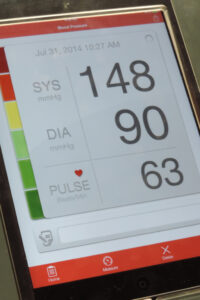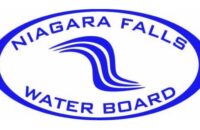Please click the link below to subscribe to a FREE PDF version of each print edition of the Niagara Reporter
http://eepurl.com/dnsYM9

A growing number of Americans have uncontrolled high blood pressure, according to new research to be presented Sept. 10-13, 2020, at the virtual American Heart Association’s Hypertension 2020 Scientific Sessions. The meeting is a premier global exchange for clinical and basic researchers focusing on recent advances in hypertension research.
The percentage of adults in the United States with controlled blood pressure continues to decline, and researchers say failure to control high blood pressure may result in more heart attacks and strokes. Researchers also believe the causes of poor blood pressure management require immediate and continued investigation.
Previous research showed about one-third (32.2%) of Americans between 1999-2000 successfully maintained blood pressure less than 140/90 mm Hg. By 2013-2014, the number had risen to more than half (54.5%), yet 2015-2016 data revealed more than a 6% drop (48%). This study, entitled “Hypertension Control in the U.S. 2009-2018: Rapidly Reversing Years of Progress,” aimed to determine whether that number dropped further between 2017-2018 and to assess if the decline was limited to adults at least 60 years old.
“We cannot assume improvement in blood pressure management will continue, even after 35 years of success. High blood pressure is a serious health risk and deserves constant attention to prevent as many heart attacks and strokes as possible,” said Brent M. Egan, M.D., a professor at the University of South Carolina School of Medicine in Greenville, South Carolina and the study’s lead author.
Using National Health and Nutrition Examination Survey (NHANES) data from 2009 to 2018, researchers assessed blood pressure control in adults older than 18. Blood pressure management and its determinants were evaluated in three age groups (18-39; 40-59; and 60 or older), comparing NHANES information from 2009-2012 and 2015-2018. Researchers examined if participants were previously told by a health care professional that they had hypertension and if they were taking medication to help control hypertension. In this study, an elevated blood pressure was defined as a blood pressure reading ≥140/90 mm Hg. According to the current American Heart Association/American College of Cardiology Guideline for the Prevention, Detection, Evaluation, and Management of High Blood Pressure in Adults, hypertension should be defined as ≥130/80 mm Hg.

Results from the study indicate:
- 11% fewer adults in the U.S. had controlled high blood pressure between 2017-2018 than between 2013-2014 (54.5% vs. 43.4%, respectively).
- Blood pressure increased 3-4 mm Hg across all age groups.
- The number of adults ages 40-59 with successfully managed blood pressure fell nearly 10% from 2009 to 2018 (56.3% vs. 46.6%, respectively).
- Successful blood pressure management also fell among adults ages 60 and older by 6% from 2009 to 2018 (53.6% vs. 47.9%, respectively).
Egan and his co-authors say the causes for fewer Americans with successfully managed blood pressure varies by age and requires further study. “A closer look at our findings revealed the fall in blood pressure control in older adults was mainly due to less effective use of blood pressure medication and management, so we need to focus on making sure the level of treatment is adequate for this age group. We found the decrease in blood pressure management among the 40-59 age group was mainly due to lack of awareness of and treatment for hypertension.”
Target: BP™ is a national initiative launched by the American Heart Association and the American Medical Association in response to the high prevalence of uncontrolled blood pressure (BP). Target: BP helps health care organizations and care teams, at no cost, improve BP control rates through the evidence-based MAP BP Program and recognizes organizations for their ongoing commitment to their patients’ cardiovascular health.
Co-authors are Jiexiang Li, Ph.D.; Susan E. Sutherland, Ph.D.; Michael Rakotz, M.D.; and Gregory Wozniak, Ph.D. No funding sources for the study were reported.
Additional Resources:
- Available multimedia is on right column of release link https://newsroom.heart.org/news/americans-continue-to-struggle-controlling-high-blood-pressure-11-fewer-adults-have-it-in-check?preview=06bb6392d18d2ed6a164d50b8ab2f9a0
- Know Your Risk Factors for High Blood Pressure
- Changes You Can Make to Manage High Blood Pressure
- Follow AHA/ASA news on Twitter @HeartNews #Hypertension20
Statements and conclusions of study authors that are presented at American Heart Association scientific meetings are solely those of the study authors and do not necessarily reflect Association policy or position. The Association makes no representation or warranty as to their accuracy or reliability. The Association receives funding primarily from individuals; foundations and corporations (including pharmaceutical, device manufacturers and other companies) also make donations and fund specific Association programs and events. The Association has strict policies to prevent these relationships from influencing the science content. Revenues from pharmaceutical and device corporations are available at https://www.heart.org/en/about-us/aha-financial-information.
About the American Heart Association
The American Heart Association is a relentless force for a world of longer, healthier lives. We are dedicated to ensuring equitable health in all communities. Through collaboration with numerous organizations, and powered by millions of volunteers, we fund innovative research, advocate for the public’s health and share lifesaving resources. The Dallas-based organization has been a leading source of health information for nearly a century. Connect with us on heart.org, Facebook, Twitter or by calling 1-800-AHA-USA1.





















